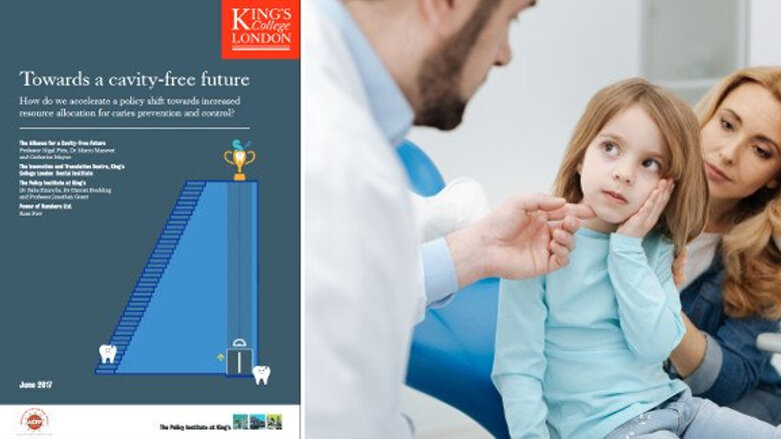LONDON, UK: A new report, published last week by the Alliance for a Cavity-Free Future (ACFF) and the Policy Institute at King’s College London in the UK, has highlighted the importance of demonstrating to policymakers the economic benefits of tackling the high rate of dental caries and gaining their commitment to the fight against the disease. The authors have further proposed key steps to speed up the process towards a cavity-free world.
The report is the product of discussions that took place at a Policy Lab meeting in June. This session for the first time brought together individuals from a range of different backgrounds—dentists, economists, public health officials, policy advisers, educators and psychologists—to provide new perspectives on the continuing problem of dental caries.
While the science on preventing the disease and stopping early-stage caries progressing is already well understood, efforts to apply it have so far fallen short, the report’s experts emphasised. They estimate that the potential economic and health benefits of a cavity-free world are significant, especially considering that caries has common risk factors with other non-communicable diseases, such as diabetes and metabolic syndrome. Reducing the risk factors associated with caries could thereby also help improve health more generally and reduce the financial costs arising from other conditions, they explained.
To have policymakers actively engaged in the fight against the disease, systematic economic and comprehensive clinical data must be collected, the report urged. In addition, increased efforts should be made to accelerate the move towards a greater focus on preventative dental care. To this end, the authors proposed creating new remuneration systems for dentists to ensure that caries prevention and control are properly rewarded, as well as promoting efforts to encourage behaviour change in the public and implementing incentives for the industry to adopt more socially responsible agendas, among other measures.
Concerning the proposal to revise dental remuneration systems, ACFF Global Chairman Dr Nigel Pitts told Dental Tribune Online: “Current payment systems do not typically pay dentists to ‘do prevention’ and there is no financial incentive for dentists to spend time and resources on preventatively oriented care pathways. In order to see progress, this needs to change.”
In addition, Pitts highlighted the importance of closer collaboration between dental and medical practitioners. “Maximising the effectiveness of caries preventative caries management will increasingly draw on a multidisciplined workforce of teams made up of professionals with a mix of skills best suited to the environment they work in and the range of patients they support. This involves empowering the existing workforce with the knowledge they need and also, where possible, expanding the range of people who can advise, refer and, in some cases, treat around issues of dental caries and dental health.”
Untreated dental caries in permanent teeth affects 2.4 billion people and was the most prevalent condition among all participants evaluated in the 2016 Lancet Global Burden of Disease study. Untreated caries in children’s teeth was the tenth most prevalent condition, affecting over 621 million children worldwide.
“It is our job as dental and health professionals to ensure that the health of the public and patients is our priority. By working together across stakeholders to progress a shift towards prevention rather than just restorative treatment of caries, we will be ensuring a healthier future for millions as well as securing greater access to care for excluded patients,” Pitts said.
The full report can be downloaded here.
NORTHAMPTON, UK: More than 2,000 dentists left the National Health Service (NHS) in 2021, leaving an estimated four million people without access to oral ...
NEWCASTLE, UK: Given the abundance of dietary recommendations that can be accessed these days, understanding what we should and should not eat can be a ...
LONDON, UK: Workplace stress can lead to mounting anxiety or even depression. As is the case with other healthcare providers, dentists and doctors are often...
LONDON, UK: In celebration of World Oral Health Day, representatives of the FDI World Dental Federation presented the latest findings on oral health on 20 ...
STIRLING, UK: A recent survey conducted by the British Dental Association (BDA) has found that a Scottish government initiative to potentially extend the ...
MANCHESTER, UK: In the Greater Manchester region, the most common reason for young children being admitted to hospital is to have a tooth removed. In ...
The global dental composites market is anticipated to grow, due to changes in diet and lifestyle, and a rapidly growing geriatric population across the ...
LONDON, England: The UK dental crisis is a highly significant public health issue, having escalated in recent years owing to continued reductions in ...
LONDON, UK: Dentists may sometimes encounter patients who are agitated during a dental appointment and who become violent or aggressive. The Dental Defence ...
DUBLIN, Ireland: A breach of contract claim between model and presenter Vogue Williams and a Dublin dental clinic was settled in court last week. The legal ...
Live webinar
Wed. 4 March 2026
5:00 pm UTC (London)
Munther Sulieman LDS RCS (Eng) BDS (Lond) MSc PhD
Live webinar
Wed. 4 March 2026
6:00 pm UTC (London)
Live webinar
Thu. 5 March 2026
1:30 am UTC (London)
Lancette VanGuilder BS, RDH, PHEDH, CEAS, FADHA
Live webinar
Fri. 6 March 2026
8:00 am UTC (London)
Live webinar
Mon. 9 March 2026
4:30 pm UTC (London)
Live webinar
Mon. 9 March 2026
7:00 pm UTC (London)
Live webinar
Tue. 10 March 2026
8:00 am UTC (London)
Assoc. Prof. Aaron Davis, Prof. Sarah Baker



 Austria / Österreich
Austria / Österreich
 Bosnia and Herzegovina / Босна и Херцеговина
Bosnia and Herzegovina / Босна и Херцеговина
 Bulgaria / България
Bulgaria / България
 Croatia / Hrvatska
Croatia / Hrvatska
 Czech Republic & Slovakia / Česká republika & Slovensko
Czech Republic & Slovakia / Česká republika & Slovensko
 France / France
France / France
 Germany / Deutschland
Germany / Deutschland
 Greece / ΕΛΛΑΔΑ
Greece / ΕΛΛΑΔΑ
 Hungary / Hungary
Hungary / Hungary
 Italy / Italia
Italy / Italia
 Netherlands / Nederland
Netherlands / Nederland
 Nordic / Nordic
Nordic / Nordic
 Poland / Polska
Poland / Polska
 Portugal / Portugal
Portugal / Portugal
 Romania & Moldova / România & Moldova
Romania & Moldova / România & Moldova
 Slovenia / Slovenija
Slovenia / Slovenija
 Serbia & Montenegro / Србија и Црна Гора
Serbia & Montenegro / Србија и Црна Гора
 Spain / España
Spain / España
 Switzerland / Schweiz
Switzerland / Schweiz
 Turkey / Türkiye
Turkey / Türkiye
 UK & Ireland / UK & Ireland
UK & Ireland / UK & Ireland
 International / International
International / International
 Brazil / Brasil
Brazil / Brasil
 Canada / Canada
Canada / Canada
 Latin America / Latinoamérica
Latin America / Latinoamérica
 USA / USA
USA / USA
 China / 中国
China / 中国
 India / भारत गणराज्य
India / भारत गणराज्य
 Pakistan / Pākistān
Pakistan / Pākistān
 Vietnam / Việt Nam
Vietnam / Việt Nam
 ASEAN / ASEAN
ASEAN / ASEAN
 Israel / מְדִינַת יִשְׂרָאֵל
Israel / מְדִינַת יִשְׂרָאֵל
 Algeria, Morocco & Tunisia / الجزائر والمغرب وتونس
Algeria, Morocco & Tunisia / الجزائر والمغرب وتونس
 Middle East / Middle East
Middle East / Middle East
















































To post a reply please login or register